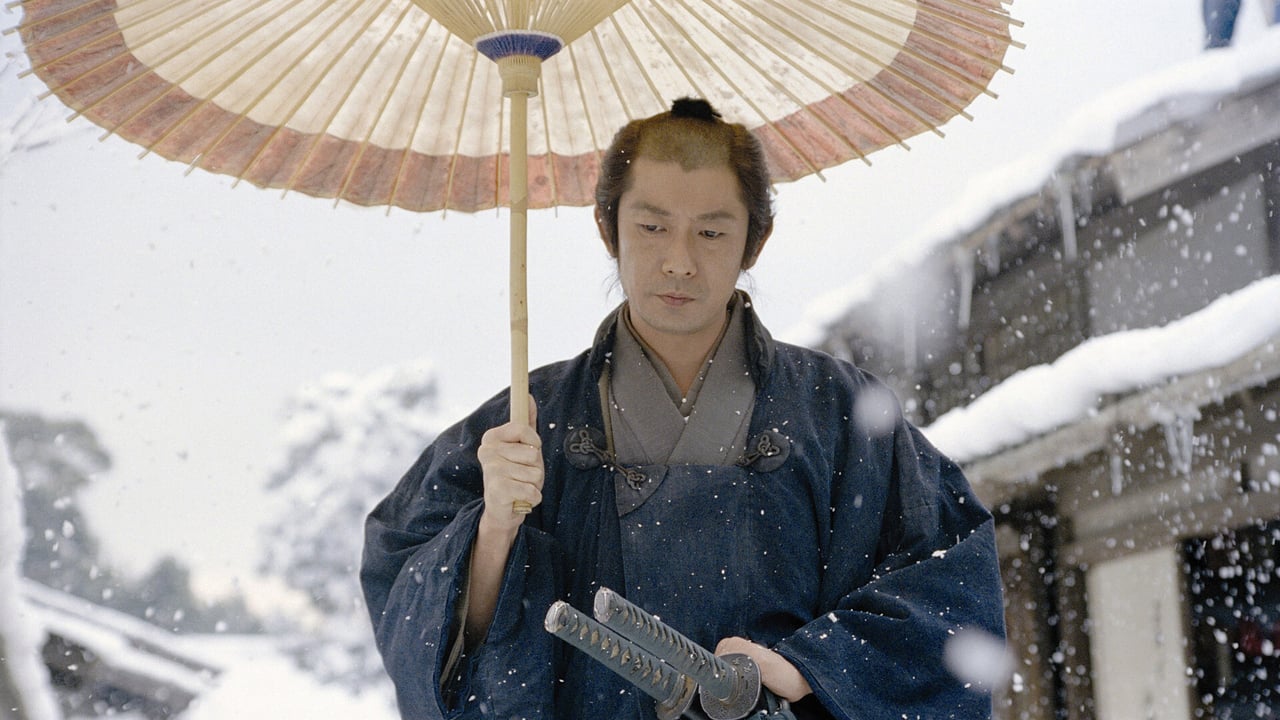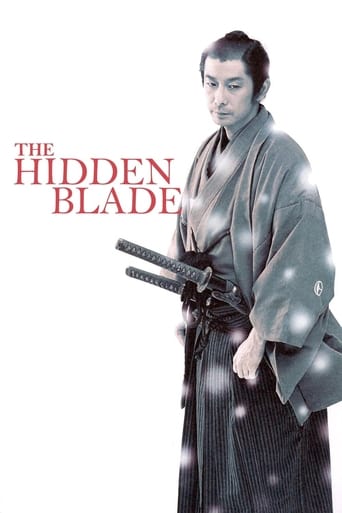

This is the second of director Yoji Yamada's work on converting Shuhei Fujisawa's novels into a movie, and first from the Fujisawa's Hidden Sword series short novels. Other stories from Hidden Sword series that Yoji Yamada made into movies includes Hisshi Ken Torizashi, and Bushi no Ichibun.This movie is an amalgamation of two of Shuhei Fujisawa's novels - one is the title novel Kakushi Ken Oninotsume, and the second Yuki Akari (Snow Light) which is a love story. Fujisawa's novel has a style that mixes human drama and the unusual talent the main character has that leads to the bombastic climax. This movie is no exception.True to its origin, there are two stories going on simultaneously in this movie. One is story between Shuzo Katagiri (Masatoshi Nagase), and Kie (Takako Matsu) who is a maid that was working at Shuzo's house since she was a child, and Shuzo's friend Yoichiro (Yukiyoshi Ozawa) who planned a coup against the clan and is now being jailed awaiting execution. Kie was married to another family, but she was treated very poorly, and became ill. She would have died if Shuzo has not extricated her from that family and brought her back. But living with a woman he saved, causes rumors and he decides to let Kie return to her family. Yoichiro escapes from from imprisonment and because he's one of the best swordsman in the clan, Shuzo who is the only one that can match Yoichiro's skill is dispatched to take him down.This is one of the best samurai movies to come out of Japan in recent years. All of Yoji Yamada's movies based on Shuhei Fujisawa's novels are excellent quality, with some of the best sword fighting scenes. The entire series is recommended for viewing as they are some of the best Asian movies you can watch.
... View MoreWith Yoji Yamada's The Hidden Blade, set in the early 1860s, the age of the samurai was passing; the age of moviedom's bastardization of the samurai was sometime in the future. The Hidden Blade is one of three movies Yamada made based on stories by Shuhei Fujisawa. They all deal with the end of the rigid social caste system of the Tokugawa era, the cracks and corruption in the samurai code, and the effects of this on some of those in the samurai class whom we come to know. These movies aren't flash and slash epics or just cheap entertainment. The films in many ways are quiet, even when there is violence. Sadness and difficult choices are pervasive. The films, in other words, are wonderful. For the record, the three films are The Twilight Samurai (Tasogare Seibei) (2002), The Hidden Blade (Kakushi Ken Oni no Tsume) (2004) and Love and Honor (Bushi no Ichibun) (2006). The Hidden Blade is the story of Munezo Katagiri (Masatoshi Nagase), a poor samurai who does his duty to his clan in a small village in the north of Japan. His father was forced to commit hari kiri unjustly, but the father submitted because obeying the lord was the core of his life. A friend of Katagiri's, Yaichiro Hazama, who earlier went to Edo, has been implicated in a treason plot against the shogun. Hazama is sent back to the village for imprisonment. At the same time, Katagiri's sister has married a good friend, his mother has died, and he has found a merchant husband for the family's maid, a young woman named Kie (Takako Matsu), the daughter of a farmer who had been trained in many skills by Katagiri's mother. We can tell there is affection and respect between the two, but the idea of marriage is never recognized because of the rigid separation of the four castes. Katagiri rescues Kie from the cruel marriage but cannot keep her with him. He returns her to her farmer father. When Hazama escapes, Katagiri is ordered to go to Hazama, one of his best friends, and kill him in a duel. Hazama is a fine swordsman. Katagiri is almost as good. Katagiri learns his clan's senior adviser is venal and dishonest. Katagiri must obey, but afterwards, in disgust, takes his own actions. At last he secures his future, whatever that might be...but it won't be as a samurai. If this all sounds mundane, it is and it isn't. In slightly more than two hours, Yamada lets us see these people's lives, everything from the rigid strictures of behavior and outward respect to how a servant washes clothes, from how to cut firewood to what a prisoner basket is, from what a poor samurai's house is like or a merchant's fabric shop to what it takes to train barely educated bumpkin samurai in gunnery and marching. It's all fascinating, more so because these are all more-or-less ordinary people in a system of rigid class inequities, where people have few if any options. Yet if Munezo Katagiri's story is told deliberately, it is never slow. Yes, we have a great (and not flashy) sword fight toward the end of the movie, and a fast and satisfying act of deadly justice to witness. The heart, however, of the movie's tension comes from Karagiri's struggle to obey the old rules while realizing how unjust and corrupt they can be. Masatoshi Nagase gives a marvelous performance...thoughtful, serious, underplayed. The movie ends with a mutual expression of love and commitment between Katagiri and Kie that is delightful and touching. One of the fascinating aspects of Japan is how rigidly enforced and how accepted the social order was, and then how quickly and, in some cases, how ruthlessly it began to crumble. The samurai class, above the other three classes, was made up of warriors without wars. They sank into near irrelevance except for their privileges and social status. The merchant class, lowest of the classes, rose to power because they produced nothing of value, in the Buddhist sense, just money. Money proved more powerful than swords. By the end of The Hidden Blade it's clear that disciplined peasants bearing expensive firearms can take care of any charging, sword-bearing samurai they might encounter.
... View MoreOther reviewers said all that needs to be said about the qualities of this wonderful film. I will just cover a plot detail which can easily be overlooked, but which reveals just how intelligent the story really is. That detail is the "hidden blade" itself.When the duel ends, the dying Hazama is pained by two things: that our hero Katagiri did not condescend to use the secret technique of the Hidden Blade against him; and that their master taught the technique to the inferior pupil. In fact, it is confirmed twice during the film - first by Katagiri and then by Hazama - that Hazama would have won their mock duels in the past if they had fought with real blades. Hazama was the better swordsman of the two, but he wasn't allowed to learn the Hidden Blade. Why? We see the Hidden Blade at the end of the film, when Katagiri uses it against his superior, who was a scoundrel. We understand that the Hidden Blade is not a fighting technique, but a murdering technique. It cannot honorably be used against a samurai in a fight. That explains why he didn't use it against Hazama.OK, but why didn't their master teach Hazama the Hidden Blade? The answer is simple: that technique has nothing to do with who is a better swordsman. Since it is so deadly, it can be taught only to a person who will not abuse it, a person of integrity. And Hazama was never such a person.In this way, the ending cleverly ties all the loose ends of this great film.
... View MoreMunezo Kitagiri (Masatoshi Nagase) is another of Yoji Yamada's twilight samurais, a sad-faced, much of the time useless, man. When he finds happiness at the end, it's through a kind of lonely exile. It's only when Hidden Blade (Kakushi-ken oni no tsume) is two-thirds over that there's some serious swordplay; but like a dish served after a long fast, this death struggle, even though it's aborted, feels delicious.Kitagiri lives in the shadow of his father's disgrace, and creates his own disgrace when he steals a married woman of peasant origins from her husband. The pretty young Kie (Takao Matsu) once worked in his mother's household, and (this is a soft-hearted tale) Kie and Kitagiri have always been sweet on each other. When he finds out several years later that she's not only unhappy with her merchant husband but now ill and left to waste away in her bed there by her wicked stepmother, Kitagiri simply puts Kie on his back and takes her home. Kie returns to health and thrives in her old surroundings and the merchant family lodges no protest -- but as a samurai Kitagiri can't really marry Kie and so must reluctantly order her to return to her parents.Kitagiri can't seem to get anything right. His uncle criticizes him for capitulating to modern ways because his clan is being clumsily trained to use rifles and canons scenes of which we see periodically.In the opening scene we've seen Kitagiri and his close friend Samon Shimada (Hidetaka Yoshioka) bid farewell to Yaichiro Hazama (Yukiyoshi Ozawa), a fellow samurai who's been posted to Edo. Shimada's wedding is an occasion for elders to criticize Kitagiri, and also a sign that Kitagiri is falling behind by not marrying himself. Both Shimada and Kitagiri are "backwater samurai" as the somewhat prissy sensei sent to train their clan gunsmanship puts it, while Hazama in contrast exemplifies sophistication and success, and he's a true samurai, the best swordsman of his clan. The training in marching and rifles is occasion for much buffoonery. Hidden Blade modulates delicately from romance to comedy to solemn drama to adventure story, and back again.Fortunes can shift rapidly in the feudal world and at the end of the story the successful, much favored Hazama though he has a beautiful, elegant wife (Reiko Takashima) prepared to do anything for him has led a rebellion against the Shogunate and thereby become an escaped criminal, and the chief retainer, Shogen Hori (Ken Ogata), orders Kitagiri to perform his final, no-win battle: to challenge Hazama to a swordfight which he cannot lose.If Kitagiri wins the battle he will be killing an old friend. If he loses, he will have failed his clan and added more disgrace to his name.Hazama's wife comes to Kitagiri the night before and begs him to let Hazama escape into the mountains; and when Kitagiri can't agree to that, she promises to appeal to the chief retainer.I don't think as some do that this is less effective than Twilight Samurai. It may move along in fits and starts but it lacks the latter's longeurs. Hidden Blade's final swordfight isn't as elaborate or excruciating and suspenseful as Twilight Samurai's, but it has the virtue of not being so drawn out. It seems odd that Kitagiri ends up seeking revenge against his chief retainer, even though the man has undoubtedly done something highly improper. Sensibly, he renounces his samurai status. The ending is quite sentimental, but one can't fault the movie for being sweet. A samurai would never do what Kitagiri does at the end, but he is no longer a samurai.Yamada has his limitations, but he's also found ways of breathing life back into the samurai genre; he's not so much rehabilitated it as reconceived it, by seeing the samurai in more specific social and historical terms. Nagase as Kitagiri has a kind of ascetic antihero nobility and Ozawa as Hazama looks as dashing as Johnny Depp in his pirate mode, but with staring eyes and matted hair instead of a grin and eyeliner. Hazama is magnificent, almost like a Japanese folklore demon; and when he gets his hand blown off, it's obvious the modern age has come to destroy our heroes and upstage our villains.
... View More